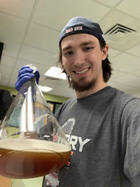Internships & Careers
Chemistry is often referred to as the "central" science. In that role, chemistry connects physics and mathematics with biology, medicine, and environmental sciences. Biotechnology, art conservation, medical research, and forensics are also paths that Chemistry graduates can take.
Many bachelors' level chemists begin their career as "bench chemists" and then earn M.B.A. degrees, effectively combining their chemical knowledge with sales, management, and marketing skills. Similarly, you can complement an undergraduate degree in Chemistry with a law degree to practice patent law.
When you graduate with a degree in Chemistry, you're ready either for graduate school or the work force.
Profiles of our Graduates
Richard Agbortoko ’08 - Alumni Spotlight December 2022
While at MCLA, Richard Agbortoko ’08 (@bigpapa_b3ar) was a Biology/Pre-Med major.
Now he works at Northern Light Mercy Hospital in Portland, Maine. As its Clinical
Pharmacist, he serves as a resource for drug information, reviews drug therapy, formulates
recommendations, participates in and supervises the preparation and distribution of
medications, supervises supportive personnel, and serves as a member of the healthcare
team with the prescriber and direct caregiver.
He said his education at MCLA was the perfect preparation for graduate school. “While
I was taking classes towards an undergraduate degree, I was also able to simultaneously
acquire the necessary prerequisites for admission into any doctorate of pharmacy program
in the country,” he said, “as well be able to sit for and pass the Pharmacy College
Admission Test (PCAT).
Richard said he feels a joyous sentiment when thinking of MCLA and how many lifelong
friends he made there. “MCLA was the perfect place for, at the time, a reserved 18-year-old
who had just left all he knew behind and moved to the U.S.,” he said. “I had lots
of assistance from staff and faculty during my time at MCLA, and I’d like to extend
my gratitude to Donna Poulton, Ann Billetz, Jerry Smosky, and Robert Harris.”
Jeffrey Mason '17
 “During my time at MCLA, I was fortunate to have many practical experiences related
to chemical education. I was hired as a full-time Chemistry and Forensics teacher
in the Monson Public School system about a month after graduation and I continue to
work there. I am currently attending Elms College as a Masters of Education candidate
and I plan to pursue a doctoral degree in Education following the completion of the
Masters program. Currently, I teach Chemistry I Honors, Chemistry II Honors, Chemistry
I, Forensics, and Integrated Science. The Chemistry department did an excellent job
in preparing me for this field by giving me the opportunity to tutor Introduction
to Chemistry for 5 of the 8 semesters that I attended MCLA. They also did an excellent
job in giving me the lab skills and reasoning that are needed to design and implement
rewarding lab experiences. I am currently attending Elms College as a Masters of
Education candidate and I plan to pursue a doctoral degree in Education following
the completion of the Masters program.”
“During my time at MCLA, I was fortunate to have many practical experiences related
to chemical education. I was hired as a full-time Chemistry and Forensics teacher
in the Monson Public School system about a month after graduation and I continue to
work there. I am currently attending Elms College as a Masters of Education candidate
and I plan to pursue a doctoral degree in Education following the completion of the
Masters program. Currently, I teach Chemistry I Honors, Chemistry II Honors, Chemistry
I, Forensics, and Integrated Science. The Chemistry department did an excellent job
in preparing me for this field by giving me the opportunity to tutor Introduction
to Chemistry for 5 of the 8 semesters that I attended MCLA. They also did an excellent
job in giving me the lab skills and reasoning that are needed to design and implement
rewarding lab experiences. I am currently attending Elms College as a Masters of
Education candidate and I plan to pursue a doctoral degree in Education following
the completion of the Masters program.”
Bethany Brown '16
 “After graduating from MCLA I was accepted into the Doctor of Pharmacy program at
Western New England University College of Pharmacy and Health Sciences. At COPHS courses
are designed to teach the technical, knowledge-based, administrative, and social aspects
required to become a leader in pharmacy. The variety of courses I took at MCLA supplied
me with a strong platform to start my graduate courses and allowed me focus on the
more in depth portions of the curriculum. One of my favorite parts of my current program
is the way we are encouraged to be engaged not only within in the classroom, but within
our surrounding communities as well. I believe the environment within MCLA helped
to instill the importance of community engagement within me. The courses I took during
my undergraduate years taught me a variety of skills, such as research techniques
and the ability to distinguish the quality of published papers. While at MCLA I was
also able to complete an internship and work as a teacher’s assistant. These experiences
showed me the importance of being able to work independently, but also to take the
time to listen to others, two invaluable skills in my current program. In 2021 I will
graduate from COPHS as a PharmD, and I can credit my time at MCLA for allowing me
to get to this point.”
“After graduating from MCLA I was accepted into the Doctor of Pharmacy program at
Western New England University College of Pharmacy and Health Sciences. At COPHS courses
are designed to teach the technical, knowledge-based, administrative, and social aspects
required to become a leader in pharmacy. The variety of courses I took at MCLA supplied
me with a strong platform to start my graduate courses and allowed me focus on the
more in depth portions of the curriculum. One of my favorite parts of my current program
is the way we are encouraged to be engaged not only within in the classroom, but within
our surrounding communities as well. I believe the environment within MCLA helped
to instill the importance of community engagement within me. The courses I took during
my undergraduate years taught me a variety of skills, such as research techniques
and the ability to distinguish the quality of published papers. While at MCLA I was
also able to complete an internship and work as a teacher’s assistant. These experiences
showed me the importance of being able to work independently, but also to take the
time to listen to others, two invaluable skills in my current program. In 2021 I will
graduate from COPHS as a PharmD, and I can credit my time at MCLA for allowing me
to get to this point.”
Jacob Kress '16
 “After I graduated MCLA in 2016 I stared my graduate work at the University of Massachusetts
Dartmouth. I am currently working towards my PhD in biochemistry. My research is focused
on protein structures, specifically proteins involved with the immune system and HIV.
While I was at MCLA I majored in chemistry, minored in biology, and had a concentration
in biochemistry. At MCLA I learned not only the fundamentals of chemistry and biochemistry
but how to apply them in ways you wouldn’t just find in a textbook. It wasn’t just
memorization but problem solving and asking the question why, which is something you
must do constantly in research.”
“After I graduated MCLA in 2016 I stared my graduate work at the University of Massachusetts
Dartmouth. I am currently working towards my PhD in biochemistry. My research is focused
on protein structures, specifically proteins involved with the immune system and HIV.
While I was at MCLA I majored in chemistry, minored in biology, and had a concentration
in biochemistry. At MCLA I learned not only the fundamentals of chemistry and biochemistry
but how to apply them in ways you wouldn’t just find in a textbook. It wasn’t just
memorization but problem solving and asking the question why, which is something you
must do constantly in research.”
